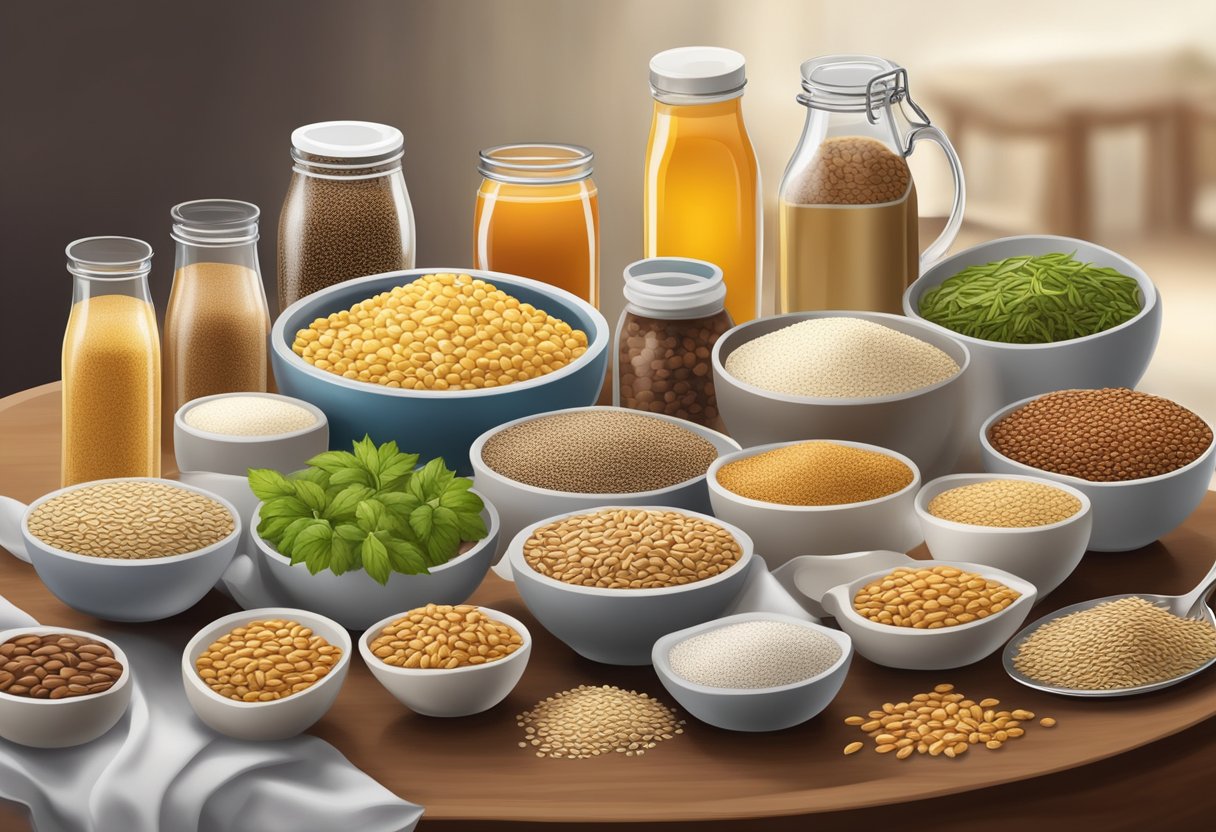Adopting a gluten-free Mediterranean diet goes beyond the selection of solid foods; it also extends to what we drink. Beverages form a significant part of our diet and for individuals with celiac disease or gluten sensitivity, ensuring drinks are gluten-free is just as important as the food they consume. The Mediterranean diet, widely known for its health benefits, primarily focuses on plant-based foods, lean proteins, and healthy fats, and can easily be adapted to exclude gluten-containing beverages.

When considering a gluten-free Mediterranean diet, it is essential to recognize the role that beverages play in the overall health profile of this eating pattern. Traditional Mediterranean drinks such as wine are naturally gluten-free, but care must be taken with other drinks that may contain hidden sources of gluten due to processing practices. Additionally, beverages consumed on this diet can contribute to the anti-inflammatory and heart-healthy qualities of the Mediterranean lifestyle.
Key Takeaways
- The Mediterranean diet includes gluten-free options that can be tailored to those with celiac disease or gluten sensitivity.
- Beverages are an integral part of the gluten-free Mediterranean diet, with an emphasis on natural, unprocessed drinks.
- The right selection of beverages can enhance the anti-inflammatory and heart health benefits of a gluten-free Mediterranean diet.
Table of Contents
Understanding Gluten and Celiac Disease
Before delving into gluten-free beverages within a Mediterranean diet, it is paramount to understand the basics of gluten and how it affects individuals with celiac disease.
What Is Gluten?
Gluten is a family of proteins predominantly found in grains like wheat, barley, and rye. It acts as a glue that holds food together, contributing to the elasticity and chewiness of baked goods. However, for individuals with gluten-related disorders, these proteins can trigger adverse reactions.
Overview of Celiac Disease
Celiac disease is an autoimmune disorder wherein the ingestion of gluten leads to damage in the small intestine. This damage is often associated with chronic inflammation as the body’s immune response mistakenly attacks its own tissues. The diagnosis of celiac disease is complex, involving blood tests and a biopsy of the small intestine. Once diagnosed, the primary treatment for celiac disease is a strict, lifelong gluten-free diet. This diet excludes all products containing wheat, barley, and rye, and is essential in mitigating symptoms and promoting intestinal healing.
The Mediterranean Diet Explained

The Mediterranean Diet is a way of eating based on the traditional cuisine of countries bordering the Mediterranean Sea. It emphasizes a variety of nutrient-rich foods that support a healthy lifestyle.
Key Components of the Mediterranean Diet
The Mediterranean Diet revolves around:
- Vegetables: A colorful array of vegetables takes center stage, providing essential nutrients and fiber.
- Fruits: Fresh fruits serve as a common dessert instead of sugary sweets.
- Whole Grains: Integral to the diet, grains are consumed in their whole, unprocessed form.
- Legumes: Beans, lentils, and chickpeas are regular protein sources.
- Nuts and Seeds: These are eaten in moderation for their healthy fats.
- Healthy Fats: Olive oil is the primary fat source, known for its beneficial properties.
- Fish: Rich in omega-3 fatty acids, fish is preferred over red meat and eaten frequently.
- Poultry and Dairy: Consumed in moderation, they provide additional protein.
In a gluten-free twist on this diet, traditional grains containing gluten are substituted with gluten-free options to cater to those with celiac disease or gluten sensitivity.
Health Benefits of the Mediterranean Diet
The Mediterranean Diet’s health benefits are supported by numerous studies:
-
Heart Disease: A diet rich in healthy fats, especially olive oil, may reduce the risk of heart disease.
-
Cancer: Antioxidants from fruits and vegetables can contribute to cancer prevention.
-
Neurodegenerative Diseases: Foods high in omega-3 and other nutrients might lower the risk of Alzheimer’s disease.
-
Metabolic Conditions: Adherence to this diet can have favorable impacts on type 2 diabetes and metabolic syndrome.
The anti-inflammatory properties of many ingredients, coupled with a balance of protein, fiber, antioxidants, and essential nutrients, make the Mediterranean Diet a model for healthy eating and long-term health.
Gluten-Free Mediterranean Diet Essentials

The Gluten-Free Mediterranean Diet combines the heart-healthy principles of the traditional Mediterranean diet with the dietary needs of those with gluten intolerance. It emphasizes the importance of gluten-free grains and dairy alternatives that align with Mediterranean dietary patterns.
Gluten-Free Alternatives to Mediterranean Staples
Mediterranean cuisine traditionally includes grains like wheat and barley, which are not suitable for a gluten-free diet. However, many gluten-free grains can be used as alternatives without sacrificing flavor or texture:
- Rice: A staple in gluten-free diets, often used in pilafs and as a side dish.
- Quinoa: A nutrient-rich pseudocereal that can be used in salads or as a substitute for couscous.
- Buckwheat: Despite its name, buckwheat is gluten-free and can be used in place of wheat flour.
- Corn: Ground into flour for gluten-free bread or used as cornmeal in polenta.
- Sorghum: Versatile grain that can be cooked like rice or ground to make gluten-free flour.
- Soy: Soybeans can be processed into a variety of gluten-free products like tofu and tempeh.
Choosing Gluten-Free Dairy Products
In the Mediterranean diet, dairy is consumed in moderation, with a focus on fermented products like Greek yogurt and cheese. Those following a gluten-free regimen should opt for dairy products that do not contain additives that may harbor gluten:
- Greek yogurt: High in protein and usually gluten-free; essential to check labels for any gluten-containing additives.
- Cheese: Many cheeses are naturally gluten-free, but it’s crucial to check for cross-contamination in manufacturing.
- Yogurt: A healthy option when confirmed to be gluten-free; excellent when topped with gluten-free grains and fruits.
Consumers should be vigilant when selecting gluten-free Mediterranean diet beverages, ensuring they avoid drinks derived from gluten-containing grains and always checking product labels for certification and gluten content.
Incorporating Gluten-Free Grains and Seeds

When adopting a gluten-free Mediterranean diet, it’s essential to choose grains and seeds that are inherently gluten-free and ensure they are not cross-contaminated with gluten-containing grains. This will help maintain variety and nutrition in your diet.
Safe Grains and Seeds to Enjoy
Grains and Seeds:
- Rice: Naturally gluten-free and can be enjoyed in various forms such as brown or wild rice.
- Quinoa: A protein-rich seed that is versatile and gluten-free.
- Buckwheat: Despite its name, it is a gluten-free seed and suitable for the diet.
- Corn: A staple grain in many diets, it can be consumed as on-the-cob, polenta, or cornmeal.
- Oats: Ensure they are labeled gluten-free, as oats can be contaminated during processing.
- Nuts and Seeds: Various nuts and seeds are inherently gluten-free but check for processing practices.
Understanding Labels and Cross-Contamination
Labels: Always read labels for hidden gluten. Look for terms indicating gluten-free status—consulting a registered dietitian for advice on label reading can be beneficial.
Cross-Contamination:
- Processed Foods: Be vigilant of foods processed in the same facility as gluten-containing products.
- Gluten-Free Diet: To ensure adherence to a gluten-free diet, become familiar with safe food-handling practices to avoid cross-contamination.
Meal Planning and Recipes

Crafting a meal plan centered around the gluten-free Mediterranean diet encourages a variety of wholesome foods packed with nutrients. Each meal is designed to incorporate a balance of gluten-free grains, lean proteins, and fresh produce, aiming to maintain the heart-healthy fats and flavors that the Mediterranean diet is renowned for.
Gluten-Free Breakfast Options
Breakfast options on the gluten-free Mediterranean diet are both nourishing and satisfying. An individual might start their day with a bowl of Greek yogurt topped with fresh fruit and gluten-free granola. Another option could be avocado toast using gluten-free bread accompanied by poached eggs for an extra protein boost.
- Examples:
- Greek yogurt with berries and gluten-free granola
- Gluten-free toast with smashed avocado and poached eggs
Gluten-Free Lunch Ideas
When it comes to lunch, salads are a staple in the Mediterranean meal plan because they’re an excellent way to incorporate vegetables, legumes, and nuts. One might prepare a quinoa salad with chickpeas, cucumbers, and a lemony olive oil dressing. Including some lean protein like grilled chicken or fish can keep them full and energized throughout the afternoon.
- Examples:
- Quinoa salad with chickpeas, cherry tomatoes, and feta
- Mixed greens with salmon, almonds, and balsamic vinaigrette
Dinner Delights Without Gluten
Dinner within this meal plan often showcases fish or seafood as the main lean protein, accompanied by a variety of roasted or sautéed vegetables. A gluten-free Mediterranean dinner delight could be grilled salmon with a side of lentils and asparagus. This ensures an individual gets a balance of healthy fats, protein, and fiber.
- Examples:
- Grilled salmon with herbed lentils and roasted red peppers
- Pan-seared shrimp with garlic, kale, and a squeeze of lemon
Gluten-Free Beverages

In a gluten-free Mediterranean diet, the beverage choices focus on maintaining the principles of health and simplicity. They should be free of gluten-containing grains like barley, which is traditionally used in beers.
Alcohol and the Gluten-Free Mediterranean Diet
For those who enjoy alcohol, wine is a central element in the Mediterranean diet and is naturally gluten-free. Mediterranean cultures often consume wine in moderation with meals. Gluten-free beers are crafted without barley or wheat, using instead grains like sorghum, rice, or corn. These beers provide an alternative for the diet-compliant individuals who still wish to enjoy an ale.
Staying Hydrated with Safe Choices
Water is the foundation of hydration in the Mediterranean diet, and adherents are encouraged to drink plenty of it throughout the day. Herbal teas, widely consumed in Mediterranean countries, are both calming and gluten-free, offering a flavorful hydration option without caffeine. These teas can be enjoyed hot or cold and infused with fresh herbs, such as mint or chamomile, which align with Mediterranean lifestyle practices.
Shopping and Dining Out

When adopting a gluten-free Mediterranean diet, careful selection of beverages at the grocery store and restaurants is crucial to maintain both the diet’s integrity and health benefits. The following guidelines aim to support individuals in making informed decisions while shopping or dining out.
Creating a Gluten-Free Grocery List
To ensure a seamless shopping experience, start by crafting a detailed grocery list that focuses on whole foods such as fruits, vegetables, nuts, seeds, and legumes. Check for gluten-free labels on beverages, particularly flavored waters and non-dairy milks, as they may contain hidden gluten.
- Vegetables and Fruits: Full of antioxidants; opt for fresh or frozen without added sauces.
- Nuts and Seeds: Look for unsalted, raw or dry-roasted without added flavorings.
- Healthy Fats: Include olive oil and avocado oil, but verify there are no added infusions.
- Legumes: Choose plain beans, lentils, and chickpeas; avoid pre-seasoned varieties.
- Poultry: Fresh chicken or turkey; avoid pre-marinated or processed options.
- Mediterranean Diet Meal Plan Beverages: Naturally gluten-free drinks like pure fruit juices, herbal teas, and mineral water.
Remember, always cross-reference ingredients to your Mediterranean diet meal plan to ensure that your beverage choices fit within the dietary guidelines.
Tips for Gluten-Free Dining
When dining out, communicate your dietary restrictions clearly to the restaurant staff and inquire about gluten-free beverage options. Confirm that your drink selections are safe from cross-contamination, a common issue in food service environments.
- Ask for Advice: Do not hesitate to consult with a registered dietitian experienced with gluten-free dining for personalized restaurant recommendations.
- Read the Labels: For bottled beverages, always inspect the ingredients label—even if an item appears to be gluten-free.
- Verbal Confirmation: Have a conversation with the server about their gluten-free practices to ensure your beverage is prepared according to your needs.
By being diligent and well-prepared, individuals can successfully navigate both grocery shopping and dining out while adhering to a gluten-free Mediterranean diet.
Overall Health and Lifestyle

Adopting a gluten-free Mediterranean diet is closely tied to enhanced overall health through balanced nutrition and lifestyle practices. These approaches help mitigate the impact of celiac disease and may promote longevity by reducing the risk of chronic illnesses.
Daily Practices for a Healthy Lifestyle
Healthy eating forms the cornerstone of daily practices within the gluten-free Mediterranean diet. This diet places emphasis on nutrients such as fiber and healthy fats, grounded in the consumption of fruits, vegetables, and gluten-free grains. Additionally, exercise and stress management are paramount, aligning with the lifestyle’s holistic view on wellbeing. The incorporation of these practices not only helps in weight loss but also manages the potential weight gain often associated with gluten-free diets.
Long-Term Benefits of a Gluten-Free Mediterranean Diet
Over time, those adhering to a gluten-free Mediterranean diet may experience a reduced risk of developing chronic diseases, such as type 2 diabetes and heart disease, according to organizations like the Celiac Disease Foundation. This dietary approach is particularly beneficial for individuals managing celiac disease, as it supports overall health while avoiding gluten. Its high content of fiber and healthy fats from sources such as olive oil and nuts is instrumental in promoting longevity and a proactive stance against chronic ailments.
Frequently Asked Questions

Navigating a gluten-free Mediterranean diet can raise questions about suitable beverages, adapting traditional recipes, and dining out. These FAQs address common inquiries to help one maintain a gluten-free lifestyle while enjoying the benefits of the Mediterranean diet.
What are some gluten-free beverage options suitable for a Mediterranean diet?
Gluten-free beverages that complement a Mediterranean diet include water, herbal teas, coffee, and wine in moderation. Freshly squeezed fruit juices without additives also fit well within the diet’s guidelines.
Can individuals with gluten sensitivities follow a Mediterranean diet effectively?
Yes, individuals with gluten sensitivities can follow a Mediterranean diet effectively. The diet emphasizes fruits, vegetables, legumes, nuts, seeds, and lean proteins, all of which are naturally gluten-free.
What is typically included in a gluten-free Mediterranean diet breakfast?
A gluten-free Mediterranean diet breakfast may consist of Greek yogurt with honey and walnuts, scrambled eggs with spinach, or chia seed pudding with fresh berries. These options provide a nutritious start without gluten.
Are there gluten-free options available at Mediterranean restaurants?
Mediterranean restaurants often offer gluten-free options such as grilled meats, salads, and rice dishes. Patrons should communicate their dietary restrictions to ensure meals are prepared without cross-contamination.
How can one adapt Mediterranean diet recipes to be gluten-free?
To adapt Mediterranean diet recipes to be gluten-free, one can substitute wheat-based pasta with rice or corn pasta and use gluten-free grains like quinoa or millet. Using gluten-free flours for baking is another way to maintain diet adherence.
What should one look for when purchasing gluten-free Mediterranean diet meal deliveries?
When purchasing gluten-free Mediterranean diet meal deliveries, look for services that offer detailed ingredient lists and cross-contamination policies. It’s important to verify that the meals align with both gluten-free and Mediterranean dietary principles.



